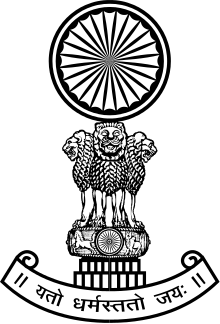Shreya Singhal v. Union of India
Shreya Singhal v. Union of India[1] is a judgement by a two-judge bench of the Supreme Court of India in 2015, on the issue of online speech and intermediary liability in India. The Supreme Court struck down Section 66A of the Information Technology Act, 2000, relating to restrictions on online speech, as unconstitutional on grounds of violating the freedom of speech guaranteed under Article 19(1)(a) of the Constitution of India. The Court further held that the Section was not saved by virtue of being a 'reasonable restriction' on the freedom of speech under Article 19(2). The Supreme Court also read down Section 79 and Rules under the Section. It held that online intermediaries would only be obligated to take down content on receiving an order from a court or government authority. The case is considered a watershed moment for online free speech in India.[2]
| Shreya Singhal v. Union of India | |
|---|---|
 | |
| Court | Supreme Court of India |
| Decided | 24 March 2015 |
| Citation(s) | WRIT PETITION (CRIMINAL) NO.167 OF 2012 |
Background
Section 66A of the Information Technology Act, made it a punishable offence for any person to
"send, by means of a computer resource or a communication device,—
(a) any information that is grossly offensive or has menacing character; or
(b) any information which he knows to be false, but for the purpose of causing annoyance, inconvenience, danger, obstruction, insult, injury, criminal intimidation, enmity, hatred or ill will, persistently by making use of such computer resource or a communication device,
(c) any electronic mail or electronic mail message for the purpose of causing annoyance or inconvenience or to deceive or to mislead the addressee or recipient about the origin of such messages,"
The vague and arbitrary terms used in the Section led to much misuse of both personal and political nature, with several criminal cases being instituted against innocuous instances of online speech, including political commentary and humour.[3] Furthermore, Section 79 of the IT Act and the Rules made thereunder,[4] which created an onerous liability regime for internet intermediaries,[5] were also challenged in a series of writ petitions before the Supreme Court, which were clubbed together and heard by a bench consisting of Justices Chelameswar and Nariman.[6]
Judgement
In a 52-page judgement, which extensively discussed Indian, English and US jurisprudence on free speech, the Supreme Court struck down Section 66-A of the Information Technology Act,[7] read down Section 79 of the Information Technology Act and the related rules, and affirmed the constitutionality of Section 69A of the Act.
Speaking for the Court, Justice Nariman discussed the various standards which are applicable to adjudge when restrictions on speech can be deemed reasonable, under Article 19(2) of the Indian Constitution. The Court held that Section 66-A was vague and over-broad, and therefore fell foul of Article 19(1)(a), since the statute was not narrowly tailored to specific instances of speech which it sought to curb. Importantly, the Court also considered the 'chilling effect' on speech caused by vague and over-broad statutory language as a rationale for striking down the provision. Further, the Court held that the 'public order' restriction under Article 19(2) of the Constitution would not apply to cases of 'advocacy', but only to 'incitement', specifically incitement which has a proximate relation to public disorder.
Of the challenge on the grounds under Article 14 of the Constitution of India, the Court held that "we are unable to agree with counsel for the petitioners that there is no intelligible differentia between the medium of print, broadcast and real live speech as opposed to speech on the internet. The intelligible differentia is clear – the internet gives any individual a platform which requires very little or no payment through which to air his views." [8]
The Supreme Court further read down Section 79 and Rule 3(4) of the Intermediaries Guidelines, under the Act, which deals with the liability of intermediaries, mostly those which host content and provide online services. Whereas the Section itself uses the term 'receiving actual knowledge', of the illegal material as the standard at which the intermediary is liable for removing content, the Court held that it must be read to mean knowledge received that a Court order has been passed asking it to take down the infringing material.
Finally, the Court also upheld the secret blocking process under Section 69A of the Act, by which the Government can choose to take down content from the Internet, holding that it did not suffer from the infirmities in Section 66A or Section 79, and is a narrowly drawn provision with adequate safeguards.
Significance
While the decision of the Supreme Court is of immense significance in protecting online free speech against arbitrary restrictions, Section 66A, which was declared unconstitutional, has continued to be used as a punitive measure against online speech in several cases.
The reading down of Section 79 of the IT act by the Supreme Court, to include the requirement that a takedown notice must be sanctioned by a court or government authority, has also been interpreted by the Delhi High Court in the case of MySpace v. Super Cassettes, to not apply to cases of copyright infringement under the Indian Copyright Act.
References
- "Shreya Singhal v. Union of India" (PDF). http://supremecourtofindia.nic.in. Retrieved 16 February 2017. External link in
|website=(help), AIR 2015 SC 1523, Supreme Court of India. - "Gautam Bhatia, The Striking Down of Section 66A".
- "Section 66A: Seven instances of alleged abuse on social media". Indian Express.
- Information Technology (Intermediaries Guidelines) Rules, 2011, (http://dispur.nic.in/itact/it-intermediaries-guidelines-rules-2011.pdf)
- Dara, Rishabh. "Intermediary Liability in India" (PDF). Centre for Internet and Society.
- "Supreme Court hearing on IT Act petitions". Software Freedom Law Centre India. Retrieved 20 June 2016.
- "The Information Technology Act". http://nyaaya.in. Retrieved 16 February 2017. External link in
|website=(help) - Para 98, Shreya Singhal v Union of India